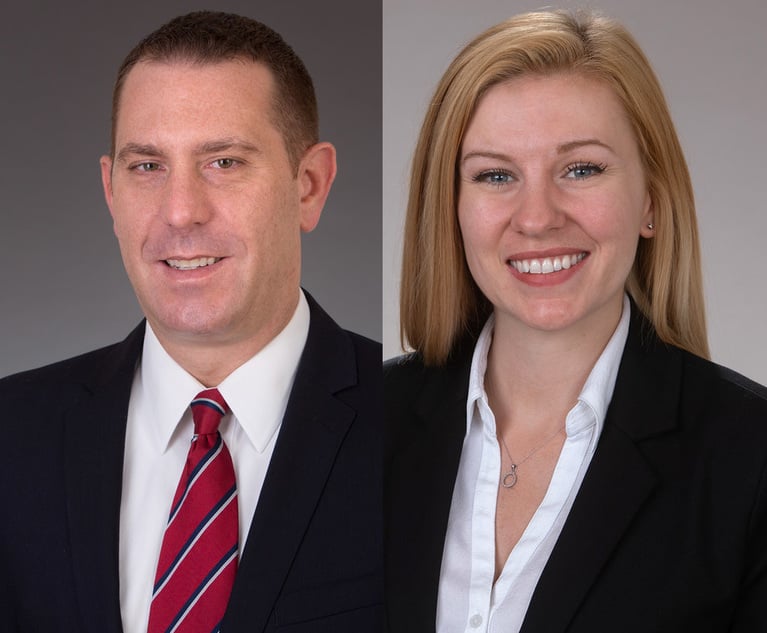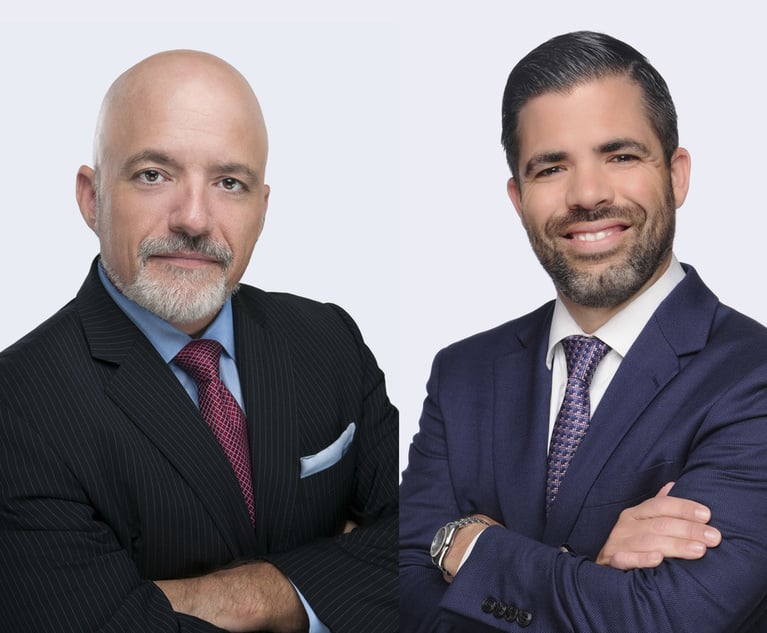The Change in LIBOR—Prepare Now as It Will Affect You and Your Business
The London Interbank Offered Rate (LIBOR), sometimes called “the world's most important number,” is being completely phased out by 2021. Even with this much advance notice, every business and those professionals who advise businesses need to begin preparation now.
January 29, 2019 at 09:00 AM
6 minute read
 Charles Tatelbaum, left, and Eli Gordon, right, of Tripp Scott.
Charles Tatelbaum, left, and Eli Gordon, right, of Tripp Scott.The London Interbank Offered Rate (LIBOR), sometimes called “the world's most important number,” is being completely phased out by 2021. Even with this much advance notice, every business and those professionals who advise businesses need to begin preparation now.
Background
LIBOR is the dominant benchmark rate for determining interest payments on almost all adjustable-rate financial products—including corporate loans, mortgages, automobile and other consumer loans and student loans. Published daily by the ICE Benchmark Administration of Britain's Financial Services Authority, LIBOR currently serves as the basis for calculating interest for between $200-$300 trillion of outstanding loan and derivative contracts.
Before diving into the legal implications of LIBOR's discontinuance, it is important to understand exactly why LIBOR is on its last leg. Because of how the rate is produced, recent revelations (primarily in Europe) have disclosed that LIBOR has been highly susceptible to rigging scandals and market manipulation. LIBOR is generated daily in response to a theoretical survey question posed to a group of large banks: “At what interest rate do you think you would have to pay to borrow money from other banks?” Instead of being based on actual transactions, the rate was being published based on speculation. It did not take market participants long to realize that they could skew LIBOR by coordinating with colleagues at other banks. Beginning in 2003, an investigation revealed a widespread plot by multiple banks—notably Deutsche Bank, Barclays and UBS—to collude and set rates at a specific number so that a position would be lucrative. This group of global banks ended up paying almost $9 billion in fines. In light of the LIBOR scandal, the ICE Benchmark Administration has decided that, beginning in 2021, they will stop conducting the LIBOR survey, a decision that effectively ends LIBOR's tenure as the world's dominant interest rate benchmark.
What to Do
The question then arises, what happens to all outstanding loans and credit agreements where the interest rate is tied to LIBOR and whose maturities extend beyond 2021? In all likelihood, many interest rate provisions tied to LIBOR contain fallback provisions providing for a substitute rate to be used in the event that LIBOR is unavailable. However, not all LIBOR-tied securities include an adequate fallback provision. In either scenario, moving away from LIBOR will require a lot of work from both borrower's counsel and lender's counsel.
First, attorneys and lenders should identify the scope of affected loan agreements and notes. This process will entail reviewing and evaluating whether existing documents that reference LIBOR have adequate fallback provisions addressing the cessation of LIBOR. The reviewers should ascertain whether these fallback provisions include a replacement rate or a specific process for arriving at a substitute rate. Replacement rates should then be closely analyzed to ensure that the pricing achieves a comparable rate to what was intended with LIBOR.
If existing fallback provisions do not adequately account for the discontinuance of LIBOR, lenders (and those who advise lenders) should seek to amend these agreements now before the change takes effect. There must be a comprehensive review of the amendment procedures of each affected agreement or debt instrument—as many amendment provisions require the consent of all parties to amend interest rate provisions. Considering how time consuming it may be to obtain consent from all parties (where it is possible that court intervention may be needed in order to force the amendment to be made), especially in syndicated credit agreements containing many lenders, those affected must be very proactive to begin the amendment process now.
Assuming that it is feasible to amend these agreements, attorneys should develop new fallback language that clearly provides for a replacement rate to be used in the event that LIBOR becomes unavailable. When determining an appropriate replacement rate, lenders must calculate what spread is necessary to achieve a substantially similar adjustable rate to what was intended using LIBOR. Existing agreements should then be amended to include the new fallback language. Moreover, the new fallback language can also be used in all new contracts that are tied to LIBOR and whose maturities extend beyond 2021.
Even after new fallback provisions are created, everyone involved should closely monitor market developments related to new fallback language. Government bodies, such as the International Swaps and Derivate Association (ISDA), are currently working to develop standardized fallback language. In the event that such standardized fallback language becomes widely adopted, lenders and their professionals should consider using the standardized language in order to simply the transition away from LIBOR.
Lastly, attorneys and accountants should diligently work to keep clients informed about the transition away from LIBOR. This will be rather significant in explaining conversion methodologies as well as new rates to be used. The professionals must explain to their clients why the spread may be different between LIBOR and the new rate.
For loan transactions based on the U.S. dollar, the Federal Reserve has developed the Secured Overnight Financing Rate (SOFR) as an alternative to replace LIBOR. However, the Prime Rate, the Fed Funds Rate and the various Swap Rates are all also viable rates that can be used instead of LIBOR. For transactions based on the pound sterling, the Bank of England has developed the Sterling Overnight Index Average (SONIA) to replace LIBOR.
Conclusion
Do not be fooled or lulled into a false sense of security that the expiration of LIBOR is two years away. Now is the time to begin the process of loan document modification which can take substantial time and effort to complete.
Charles Tatelbaum is a director at Tripp Scott in Fort Lauderdale.
Eli D. Gordon is an associate with the firm. He focuses his practice in the areas of corporate transactions, entrepreneurial business, real estate and bankruptcy.
This content has been archived. It is available through our partners, LexisNexis® and Bloomberg Law.
To view this content, please continue to their sites.
Not a Lexis Subscriber?
Subscribe Now
Not a Bloomberg Law Subscriber?
Subscribe Now
NOT FOR REPRINT
© 2025 ALM Global, LLC, All Rights Reserved. Request academic re-use from www.copyright.com. All other uses, submit a request to [email protected]. For more information visit Asset & Logo Licensing.
You Might Like
View All



Don’t Forget the Owner’s Manual: A Guide to Proving Liability Through Manufacturers’ Warnings and Instructions
5 minute readTrending Stories
- 1Judges Split Over Whether Indigent Prisoners Bringing Suit Must Each Pay Filing Fee
- 2Law Firms Report Wide Growth, Successful Billing Rate Increases and Less Merger Interest
- 3CLOs Face Mounting Pressure as Risks Mushroom and Job Duties Expand
- 4X Faces Intense Scrutiny as EU Investigation Races to Conclusion & Looming Court Battle
- 5'Nation Is in Trouble': NY Lawmakers Advance Bill to Set Parameters for Shielding Juror IDs in Criminal Matters
Who Got The Work
J. Brugh Lower of Gibbons has entered an appearance for industrial equipment supplier Devco Corporation in a pending trademark infringement lawsuit. The suit, accusing the defendant of selling knock-off Graco products, was filed Dec. 18 in New Jersey District Court by Rivkin Radler on behalf of Graco Inc. and Graco Minnesota. The case, assigned to U.S. District Judge Zahid N. Quraishi, is 3:24-cv-11294, Graco Inc. et al v. Devco Corporation.
Who Got The Work
Rebecca Maller-Stein and Kent A. Yalowitz of Arnold & Porter Kaye Scholer have entered their appearances for Hanaco Venture Capital and its executives, Lior Prosor and David Frankel, in a pending securities lawsuit. The action, filed on Dec. 24 in New York Southern District Court by Zell, Aron & Co. on behalf of Goldeneye Advisors, accuses the defendants of negligently and fraudulently managing the plaintiff's $1 million investment. The case, assigned to U.S. District Judge Vernon S. Broderick, is 1:24-cv-09918, Goldeneye Advisors, LLC v. Hanaco Venture Capital, Ltd. et al.
Who Got The Work
Attorneys from A&O Shearman has stepped in as defense counsel for Toronto-Dominion Bank and other defendants in a pending securities class action. The suit, filed Dec. 11 in New York Southern District Court by Bleichmar Fonti & Auld, accuses the defendants of concealing the bank's 'pervasive' deficiencies in regards to its compliance with the Bank Secrecy Act and the quality of its anti-money laundering controls. The case, assigned to U.S. District Judge Arun Subramanian, is 1:24-cv-09445, Gonzalez v. The Toronto-Dominion Bank et al.
Who Got The Work
Crown Castle International, a Pennsylvania company providing shared communications infrastructure, has turned to Luke D. Wolf of Gordon Rees Scully Mansukhani to fend off a pending breach-of-contract lawsuit. The court action, filed Nov. 25 in Michigan Eastern District Court by Hooper Hathaway PC on behalf of The Town Residences LLC, accuses Crown Castle of failing to transfer approximately $30,000 in utility payments from T-Mobile in breach of a roof-top lease and assignment agreement. The case, assigned to U.S. District Judge Susan K. Declercq, is 2:24-cv-13131, The Town Residences LLC v. T-Mobile US, Inc. et al.
Who Got The Work
Wilfred P. Coronato and Daniel M. Schwartz of McCarter & English have stepped in as defense counsel to Electrolux Home Products Inc. in a pending product liability lawsuit. The court action, filed Nov. 26 in New York Eastern District Court by Poulos Lopiccolo PC and Nagel Rice LLP on behalf of David Stern, alleges that the defendant's refrigerators’ drawers and shelving repeatedly break and fall apart within months after purchase. The case, assigned to U.S. District Judge Joan M. Azrack, is 2:24-cv-08204, Stern v. Electrolux Home Products, Inc.
Featured Firms
Law Offices of Gary Martin Hays & Associates, P.C.
(470) 294-1674
Law Offices of Mark E. Salomone
(857) 444-6468
Smith & Hassler
(713) 739-1250






